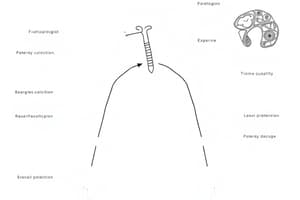Podcast
Questions and Answers
What type of disease is characterized by the body's reaction to a localized injurious agent?
What type of disease is characterized by the body's reaction to a localized injurious agent?
- Metabolic Diseases
- Neoplastic Diseases
- Inflammatory Diseases (correct)
- Degenerative Diseases
Which of the following best describes a malignant neoplasm?
Which of the following best describes a malignant neoplasm?
- A new abnormal tissue growth that spreads and invades other tissues (correct)
- A localized growth that does not require treatment
- A type of cancer that only occurs in older adults
- A tumor that is usually noninvasive
Which condition results from a disturbance of normal physiologic metabolic function?
Which condition results from a disturbance of normal physiologic metabolic function?
- Osteoarthritis
- Hyperparathyroidism (correct)
- Pneumonia
- Frostbite
What is the primary cause of traumatic diseases?
What is the primary cause of traumatic diseases?
Which type of disease results from the invasion by microorganisms?
Which type of disease results from the invasion by microorganisms?
What type of disease is rheumatoid arthritis categorized as?
What type of disease is rheumatoid arthritis categorized as?
What does the term 'pathogenesis' refer to?
What does the term 'pathogenesis' refer to?
What distinguishes 'acute diseases' from 'chronic diseases'?
What distinguishes 'acute diseases' from 'chronic diseases'?
Iatrogenic reactions are primarily caused by which of the following?
Iatrogenic reactions are primarily caused by which of the following?
Which group of diseases is characterized by being present at birth due to genetic or environmental factors?
Which group of diseases is characterized by being present at birth due to genetic or environmental factors?
What is the term for the study of the cause of a disease?
What is the term for the study of the cause of a disease?
Symptoms are defined as which of the following?
Symptoms are defined as which of the following?
Which of the following is NOT classified as a nosocomial infection?
Which of the following is NOT classified as a nosocomial infection?
Which characteristic defines hereditary diseases?
Which characteristic defines hereditary diseases?
Flashcards are hidden until you start studying
Study Notes
Introduction to Pathophysiology
- Pathophysiology connects basic sciences with clinical medicine, enhancing understanding of diseases and their mechanisms.
Common Pathological Terms
- Pathology: The study of diseases.
- Disease: An abnormal disturbance of bodily function or structure due to injury.
- Pathogenesis: Sequence of events leading to cellular changes and clinical manifestations.
- Symptoms: Patient-reported perceptions of disease (e.g., headache).
- Signs: Observable indicators detected by a physician.
- Syndrome: A cluster of signs and symptoms that characterize a specific disorder.
- Etiology: Study of the causes of diseases.
- Nosocomial Infections: Hospital-acquired infections (HAI).
- Iatrogenic Reactions: Adverse effects resulting from medical treatment.
- Idiopathic Diseases: No identifiable causative factor.
- Acute Disease: Quick onset, short duration (e.g., pneumonia).
- Chronic Diseases: Slow onset, prolonged duration (e.g., hypertension).
- Prognosis: Prediction of a disease's course and outcome.
Disease Classifications
- Congenital Diseases: Present at birth due to genetic or environmental factors.
- Hereditary Diseases: Developmental disorders genetically passed from parents.
- Sex-Linked Disorders: Genetic abnormalities on sex chromosomes (e.g., hemophilia).
- Autosomal Inheritance: Genetic abnormalities on non-sex chromosomes.
- Degenerative Diseases: Pathologies due to bodily deterioration, often age-related (e.g., atherosclerosis).
- Metabolic Diseases: Result from disturbed metabolic functions, such as hormonal imbalance (e.g., diabetes).
- Traumatic Diseases: Caused by mechanical injuries or environmental extremes (e.g., burns).
- Inflammatory Diseases: Body's response to localized injury (e.g., pneumonia).
- Infective Diseases: Caused by microorganisms.
- Toxic Diseases: Due to poisoning by biological substances.
- Allergic Diseases: Excessive reaction of the immune system.
- Autoimmune Disorders: Immune system attacks the body's own tissues (e.g., rheumatoid arthritis).
- Neoplastic Diseases: Result in abnormal tissue growth.
- Lesion: Cellular changes in response to disease.
- Benign Neoplasm: Localized, non-invasive tumors.
- Malignant Neoplasm: Invasive tumors that spread.
- Metastasis: Spread of malignant cells to other tissues.
Studying That Suits You
Use AI to generate personalized quizzes and flashcards to suit your learning preferences.





